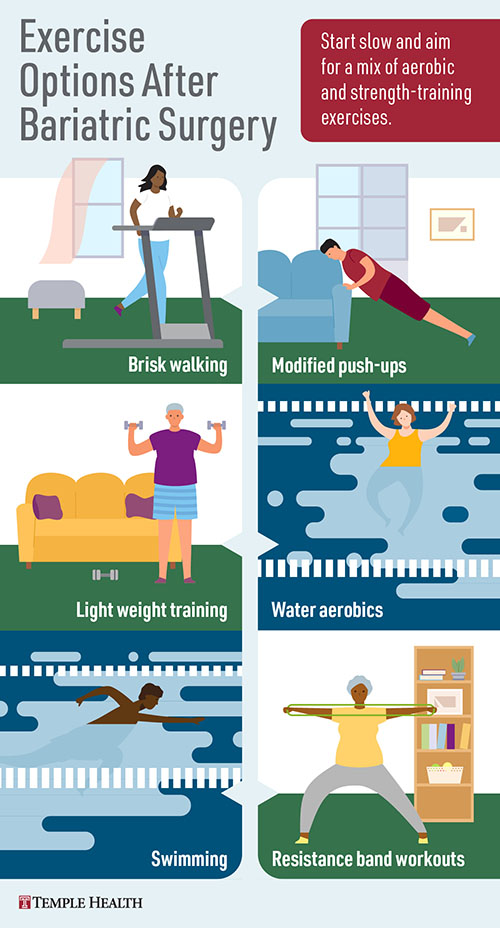One of the key steps on the journey to a successful bariatric surgery experience — both before and after the procedure — is exercise.
My patients always ask me questions about exercise. They want to know if and when they can exercise after bariatric surgery, and what kinds of exercise are safe. I reassure them that they most certainly can, and should, exercise once they have weight-loss surgery. After all, people have bariatric surgery to enjoy better health. And exercise — along with a healthy diet — is a necessary complement to surgery.
Here are some of the most common questions about exercise that I address with patients considering bariatric surgery:
Why is exercise important after bariatric surgery?
Exercise is one of the tools that will help you reach and maintain your best health after surgery. Being active helps to:
- Preserve lean muscle mass and muscle strength
- Promote the stability of your joints and enhance the strength of your bones
- Improve the elasticity of your skin after bariatric surgery
- Continue your weight loss after surgery — and most importantly — keep the weight off
Another benefit of exercise that is important to so many of my patients is that it helps them further manage some of their co-existing conditions, such as diabetes or high blood pressure, that prompted them to have bariatric surgery in the first place.
How soon can I exercise after bariatric surgery, and what precautions should I take?
1. Start with a little movement.
It’s common to be sore and uncomfortable immediately after surgery. But a little movement, like 5 to 10 minutes of walking a few times a day, can help put you on the road to recovery and is recommended by our surgeons.
2. Slowly increase your physical activity.
From there, you can slowly increase your physical activity as you heal. It’s generally safe to start exercising up to your pain threshold 2 weeks after a laparoscopic surgery (where the surgeon makes several small cuts). We do ask patients to avoid heavy lifting in excess of 10-15 pounds for the first month after surgery.
3. Avoid balance exercises.
Another issue to be aware of is balance. After surgery, your body’s center of balance changes quickly because of all the weight you’re losing, and this can impact your stability. In the first 6 months after surgery, it’s best to avoid exercises that depend heavily on balance, such as lunges or squats.
What types of exercise are best after bariatric surgery?
We all need 2 kinds of exercise, whether we’ve had weight-loss surgery or not:
- Aerobic exercise, such as walking or biking, to get our heart rate up
- Strength training, such as lifting weights or doing push-ups, to help us build and maintain muscle and strong bones
Here are some exercise routines I recommend to my patients:
Keep this handy list of exercise options after weight-loss surgery. Download a copy of our Exercise Options After Bariatric Surgery infographic.
1. Go for a walk.
You have many options for being active after surgery. I often suggest starting with a simple walking program. Walking is easy and doesn’t require any special equipment. Even if all you can do at first is walk around inside your home several times a day, that will get you moving and on your way to building stamina.
2. Try swimming, water aerobics and biking.
Swimming and water aerobics are excellent exercise choices, as they are gentle on the joints while providing both aerobic exercise and strength training. Biking is a good option, too. Remember that you can modify just about any exercise to meet your needs. As I say to my patients, a modified push-up is still a push-up.
3. After 6 months, get into aerobic activity and strength training.
In the first 6 months after surgery, I recommend 30 minutes of continuous aerobic activity 3 to 5 days a week. Add some strength training activity to your routine as well.
Once you’ve passed the 6-month mark, work to increase your physical movement. Aim for 45 minutes of continuous aerobic activity at least 4 days a week, and keep doing some strength training.
For certain people, high-intensity training may work better. Your doctor can recommend to you the best exercise plan after surgery.
What else should I keep in mind about exercise after bariatric surgery?
I remind patients that exercise, like changes in diet, is a tool for a healthy life. It can help you move toward your weight-loss goal and help you maintain your weight once you get there. You want exercise to become part of your daily routine, so it’s important to find activities you enjoy.
Don’t be afraid to try new things. Did you previously avoid exercise classes — such as yoga, aerobics or kickboxing — because of your weight or co-existing conditions like arthritis? Now is the time to explore more options like these!
Finally, remember that weight loss is like a marathon, not a sprint. It takes time, and every day is an opportunity to embrace your new lifestyle.
Supporting You Throughout Your Weight-Loss Surgery Journey
The team of specialists who lead our Bariatric Program are there to support patients through every step of their bariatric surgery journey.
The first step is a free, live virtual seminar led by an experienced Temple bariatric surgeon who will present an overview of weight-loss surgery and the necessary lifestyle changes, such as exercising, that will help ensure a successful journey.
If you can’t attend our virtual seminar, you can sign up to watch an on-demand seminar about bariatric surgery.
Helpful Resources
Looking for more information?



